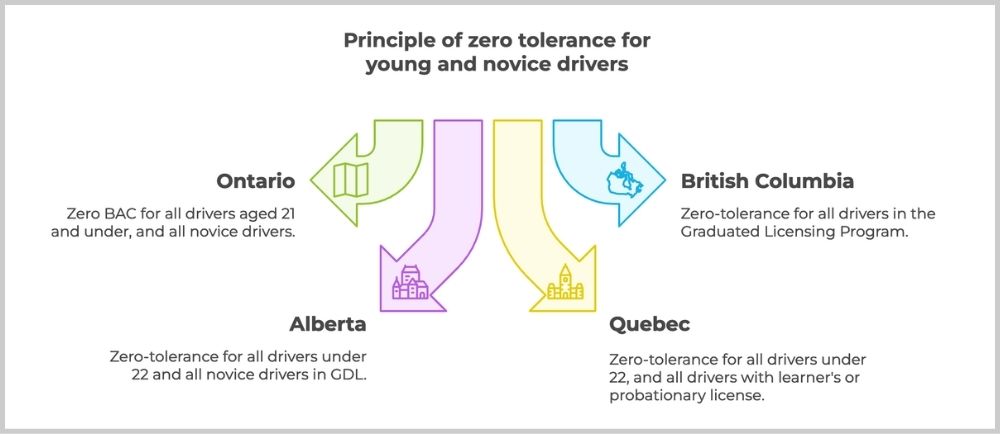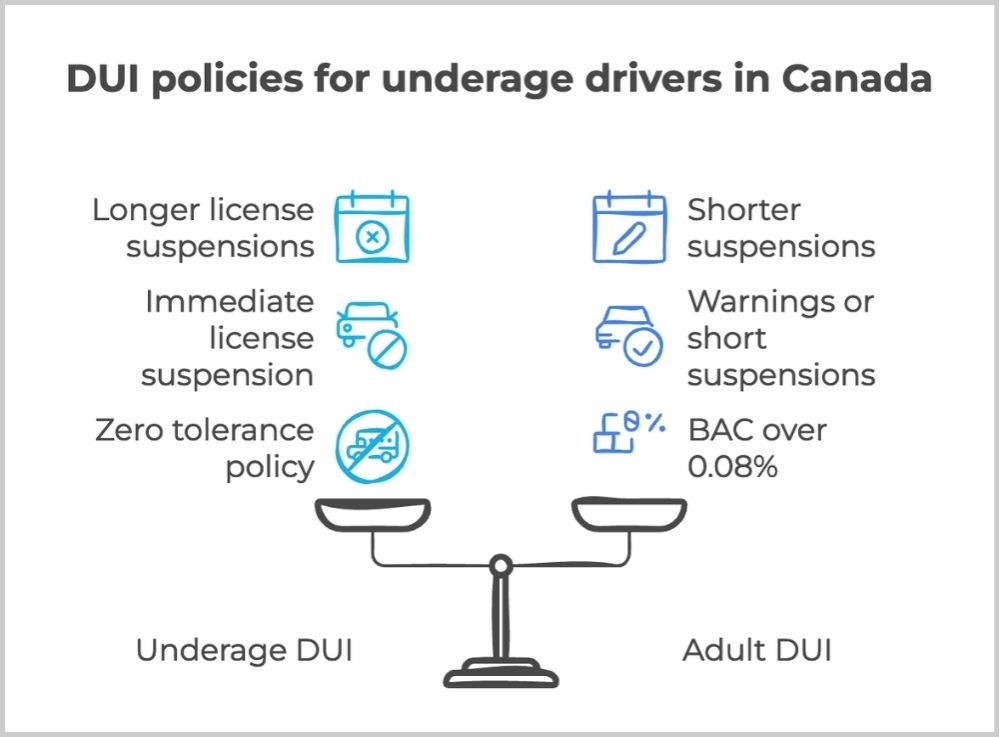Underage DUI Charges in Canada
Last Updated: November 5, 2024
In Canada, driving under the influence (DUI) is a serious offence for drivers of any age, but for underage drivers, the laws are particularly stringent.
The country has implemented a zero-tolerance policy for young and novice drivers, reflecting the heightened risks associated with inexperience combined with alcohol or drug consumption. This approach underscores Canada’s commitment to road safety and the protection of its youngest drivers.
In the context of DUI laws, “underage” typically refers to drivers under the age of 21, although the specific age can vary slightly by province.
This definition extends beyond the legal drinking age in most provinces (which is 19 in most of Canada, with the exception of Alberta, Manitoba, and Quebec, where it’s 18) to encompass young drivers who may be legally able to consume alcohol but are still considered high-risk behind the wheel.
The zero-tolerance policy for underage drivers means that any detectable amount of alcohol or drugs in a young driver’s system can result in serious legal consequences.
It’s important to note that while the federal Criminal Code of Canada sets out the basic offences and penalties for impaired driving, provinces have the authority to impose additional administrative penalties and restrictions.
This means that underage drivers may face a combination of criminal charges and provincial administrative sanctions for DUI offences.
In the following sections, we’ll delve deeper into the specific penalties, laws and consequences for underage DUI in Canada. We’ll explore how these charges can impact a young person’s life, from immediate legal consequences to long-term effects on education, employment, and future opportunities.
Understanding these implications is crucial not only for young drivers but also for parents, educators, and anyone involved in promoting road safety among Canada’s youth.

Legal Blood Alcohol Concentration (BAC) Limits for Underage Drivers
In Canada, the legal Blood Alcohol Concentration (BAC) limits for underage drivers are significantly stricter than those for fully licensed adult drivers, reflecting a zero-tolerance approach to underage drinking and driving. Zero-tolerance DUI policies in Canada are designed to protect young drivers and other road users, given the heightened risks associated with inexperience and alcohol consumption.
At the federal level, Canada enforces a zero-tolerance policy for drivers under 21 years of age, effectively setting the legal BAC limit at 0.00%. This means that any detectable amount of alcohol in a young driver’s system can result in legal consequences.
The federal Criminal Code of Canada provides the framework for this policy, which is then implemented and enforced at the provincial level.
However, it’s important to note that there are provincial variations in how this zero-tolerance policy is applied and enforced.
While all provinces adhere to the principle of zero tolerance for young and novice drivers, the specific age limits and additional restrictions can vary:

- Ontario, for example, has a zero BAC requirement for all drivers aged 21 and under, as well as for all novice drivers regardless of age. This means that even if a young driver has graduated from the province’s Graduated Licensing System, they must maintain a zero BAC until they turn 22.
- In British Columbia, the zero-tolerance policy applies to all drivers in the Graduated Licensing Program, regardless of age. This typically includes most drivers under 21, but can also apply to older novice drivers.
- Alberta enforces a zero-tolerance policy for all drivers under 22 years of age, as well as for all novice drivers in the Graduated Driver Licensing (GDL) program, regardless of age.
- Quebec has a zero-tolerance policy for all drivers under 22 years of age, as well as for all drivers with a learner’s license or a probationary license, regardless of age.
It’s also worth noting that the zero-tolerance policy typically extends to drug use as well. With the legalization of cannabis in Canada, provinces have implemented strict policies regarding drug-impaired driving for all drivers, with particularly stringent rules for young and novice drivers.
The variations in provincial laws underscore the importance of young drivers being aware of the blood alcohol limits for underage drivers in Canada. While the overarching principle of zero tolerance is consistent across Canada, the nuances of how it’s applied and the additional restrictions can differ.
Consequences of Underage DUI in Canada
The consequences of an underage DUI in Canada are severe and multifaceted, designed to serve as a strong deterrent against impaired driving among young people. These consequences can have long-lasting impacts on a young person’s life, affecting their mobility, finances, and future opportunities.
License Suspension is typically the immediate and most noticeable consequence of an underage DUI. The duration of the suspension varies by province, but it is generally more severe for underage drivers compared to fully licensed adults.
For example:
- In Ontario, underage drivers face an immediate 24-hour roadside license suspension if any alcohol is detected in their system. This is followed by a minimum 30-day suspension if convicted.
- In British Columbia, novice drivers in the Graduated Licensing Program face a 12-month prohibition for a first offence, which increases to 24 months for subsequent offences.
- Alberta imposes a one-year suspension for the first offence, with longer suspensions for repeat offences.
Fines & Penalties associated with underage DUI are substantial and can create a significant financial burden.
While the exact amounts vary by province, underage drivers typically face:
- Minimum fines can range from $1,000 to $2,000 for a first offence.
- Mandatory participation in education or rehabilitation programs comes with additional costs.
- Dramatically increased insurance premiums, often lasting for several years. Young drivers may see their insurance rates double or triple, potentially costing thousands of dollars extra per year.
- Additional administrative fees for license reinstatement and mandatory ignition interlock programs in some provinces.
Criminal Charges can result from underage DUI in certain circumstances, elevating the offence from a provincial administrative matter to a federal criminal offence.
This typically occurs when:
- The BAC is significantly over the zero-tolerance limit (usually 0.08% or higher, which is the criminal limit for adults).
- Impaired driving results in accidents, especially if they cause injury or death.
- It’s a repeat offence.

Impact on Future Opportunities
An underage DUI conviction in Canada can have profound and long-lasting effects on a young person’s future opportunities. One of the most significant consequences is the potential for a permanent criminal record.
This record can severely limit employment prospects, especially in fields that require background checks or involve driving responsibilities. International travel can also be impacted, with countries like the United States potentially denying entry to individuals with DUI convictions.
The impact on insurance rates is another significant long-term consequence. Young drivers convicted of a DUI are often designated as high-risk drivers by insurance companies. This designation typically results in dramatically increased insurance premiums, often doubling or even tripling rates for several years.
In some cases, standard insurance providers may refuse coverage altogether, forcing individuals to seek costly, high-risk insurance. These increased rates can persist for 3-5 years or more, creating a substantial financial burden during a critical period of a young person’s life when they may be pursuing education or starting their career.
Additional Consequences
Underage DUI offences in Canada often come with additional consequences beyond fines and license suspensions. Vehicle impoundment is a common penalty that can have immediate and significant impacts. The duration of impoundment varies by province but typically ranges from 3 to 30 days for a first offence, with longer periods for subsequent violations.
The costs associated with impoundment can be substantial, including towing fees, daily storage charges, and administrative fees for retrieving the vehicle. These expenses can quickly add up to several hundred or even thousands of dollars.
Mandatory programs are another key component of the consequences for underage DUI. Most provinces require offenders to complete alcohol education or rehabilitation programs. These programs aim to educate young drivers about the dangers of impaired driving and help prevent future offences.
The costs for these programs are typically borne by the offender and can range from a few hundred to over a thousand dollars. Additionally, many jurisdictions mandate the installation of an ignition interlock device as a condition for license reinstatement.
This device requires the driver to provide a breath sample before the vehicle can start. The costs associated with ignition interlock programs, including installation, monthly rental fees, and maintenance, can amount to several thousand dollars over the course of the program, which usually lasts at least one year.
Zero Tolerance vs. Adult DUI Charges

The approach to underage DUI in Canada differs significantly from adult DUI charges, reflecting a stricter stance on youth-impaired driving. Under zero-tolerance policies, underage drivers face penalties for any detectable amount of alcohol or drugs in their system, whereas adult drivers are typically charged when their blood alcohol concentration (BAC) exceeds 0.08%.
This fundamental difference results in more stringent enforcement and harsher consequences for young drivers.
Penalties for underage DUI often include immediate license suspension, even for first-time offenders, while adults may receive warnings or shorter suspensions for lower BAC levels. Underage offenders frequently face longer license suspensions, mandatory education programs, and stricter conditions for license reinstatement compared to adult offenders.
Criminal proceedings for underage DUI can be initiated at lower BAC levels than for adults, potentially leading to more severe long-term consequences.
The zero-tolerance approach also often results in additional restrictions for young drivers, such as passenger limitations and curfews, which are not typically imposed on adult offenders.
What to Do If Charged with Underage DUI
If charged with an underage DUI in Canada, the first and most crucial step is to seek experienced legal counsel immediately.
A lawyer focusing in DUI cases can provide invaluable guidance through the complex legal process and help protect your rights. They can review the circumstances of your arrest, including the validity of the traffic stop and the accuracy of any breathalyzer tests, to identify potential defences or procedural errors that could affect your case.
It’s also important to comply with all court orders and administrative requirements, such as attending mandatory education programs or installing an ignition interlock device if required. Your lawyer can help you navigate these obligations while working to minimize the impact on your future.
Final Thoughts
Underage DUI in Canada carries severe and far-reaching consequences that can significantly alter the course of a young person’s life. From immediate penalties like license suspension and hefty fines to long-term impacts on employment prospects, education opportunities, and insurance rates, the repercussions are designed to be a powerful deterrent.
The zero-tolerance approach for young drivers reflects the serious view society takes on impaired driving among youth.
Given these severe consequences, it is crucial for young drivers to make responsible decisions regarding alcohol, drugs, and driving. Always plan ahead for safe transportation when consuming any amount of alcohol or drugs.
Remember that the decision to drive impaired can have life-altering consequences not just for the driver but for others on the road as well. By prioritizing safety and responsibility, young drivers can protect their futures and contribute to safer roads for everyone. The best way to avoid the harsh penalties of underage DUI is simple: never drink or use drugs and drive.
Get A Free Consultation
"*" indicates required fields



